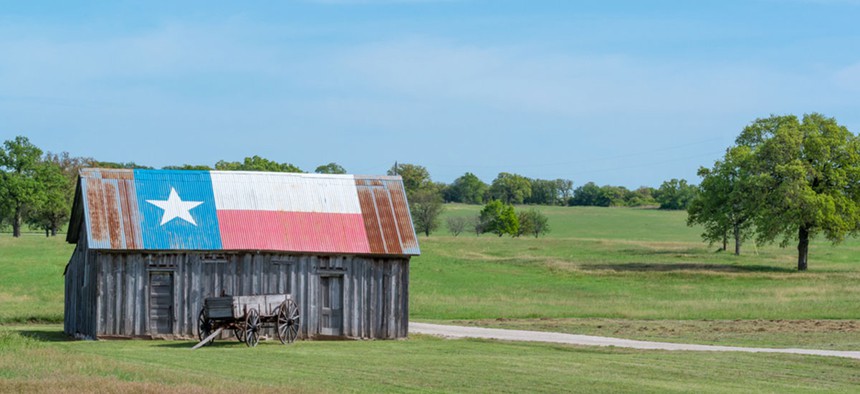Will Texas Stick Around for a Hillary Clinton Presidency?

Paul Quinn/Shutterstock.com

Connecting state and local government leaders
Three out of five Trump voters in the Lone Star State would back secession if the Democrat wins, a new poll finds.
When politicians accuse their opponents of trying to divide the country, they usually don’t mean it literally. But in Texas, Donald Trump supporters dread a Hillary Clinton presidency so much that three out of five of them would rather the state secede than live through it.
In conducting a rare general-election poll of the Lone Star State, the left-leaning firm Public Policy Polling asked voters a (mostly) hypothetical question: Would you support or oppose Texas seceding from the United States?
Fortunately for Unionists, a clear majority of 59 percent of Texans said they’d rather stick with the Stars and Stripes, while just 26 percent said they wouldn’t. But that number dropped when the pollsters followed up by asking whether voters would support secession if Clinton won the election. Forty percent said they would, including 61 percent of Trump supporters. (While PPP is run by Democrats, it has a solid grade in FiveThirtyEight’s pollster accuracy ratings.) Is the Pentagon Messing with Texas?
PPP is known for its zany survey questions. It has begun including Harambe—the gorilla killed at the Cincinnati Zoo after he grabbed and dragged a young into his enclosure—in occasional presidential ballot questions, by way of testing just how much some voters loathe their choice of candidates this year. It also asks questions that reveal just how uninformed some people are about the news. The firm asked Texans, for example, whether they believe ACORN would “steal” the election for Clinton, even though the community-organizing group shut down in 2010.
Yet there is an actual small-but-vocal movement in favor of secession in Texas. Supporters nearly succeeded earlier this year in getting the state Republican Party to endorse a referendum on the question modeled on the Scottish independence vote that occurred in the U.K. two years ago. GOP delegates prevented a resolution backing a statewide vote from being added to the party platform in May. Former Governor (and presidential hopeful) Rick Perry infamouslysuggested at a Tea Party rally in 2009 that Texas could leave the Union if it wanted to. (Actually seceding might be messy, as it was in the 19th century: The White House told petitioners in 2013 that according to an 1869 Supreme Court decision, Texas did not have a right to leave the U.S.)
In the past, liberals who live on the coasts might have simply said ‘Good riddance’ to Texas, knowing that if the nation’s largest Republican bastion dropped out of the Electoral College, Democrats would all but clinch the presidency in perpetuity. But the demographic breakdown in the PPP survey suggests they might want to have a little more patience. The survey found Trump leading Clinton by just six points overall in a state Mitt Romney won by nearly 16. And the age gap is stark: While Trump is leading by a nearly 2-to-1 margin among voters 65 and older, Clinton has the edge among all others and is ahead decisively, 60-35 percent, among Texans under the age of 45. (Conversely, the idea of seceding from the Union is more popular with younger voters than it is with older Texans, which suggests increasing polarization.)
Clinton could benefit from the presence of Libertarian nominee Gary Johnson on the ballot. He drew 6 percent of the vote. But a new independent entrant, the ex-CIA officer and House GOP policy staffer Evan McMullin, isn’t faring as well. McMullin registered 0 percent in the PPP survey and has to sue Texas just to make it onto the ballot after he missed the May filing deadline by three months.
Democrats have been predicting that Texas would turn their way for years, arguing that the rising Hispanic population there would make the state competitive in presidential races after decades of voting reliably for Republicans. That shift has yet to occur. The GOP margin actually grew between 2008 and 2012, and recent statewide races for senator and governor haven’t been close, either. Could Trump accelerate Texas’s leftward move? It’s certainly possible. While the state might not be winnable for Clinton in 2016, Democrats will take solace in the finding that younger voters and Hispanics—by a 68-27 percent margin—are moving their way. The future viability they’ve long envisioned in the Lone Star State might finally be drawing closer—if only Texas doesn’t flee the U.S. before it arrives.




